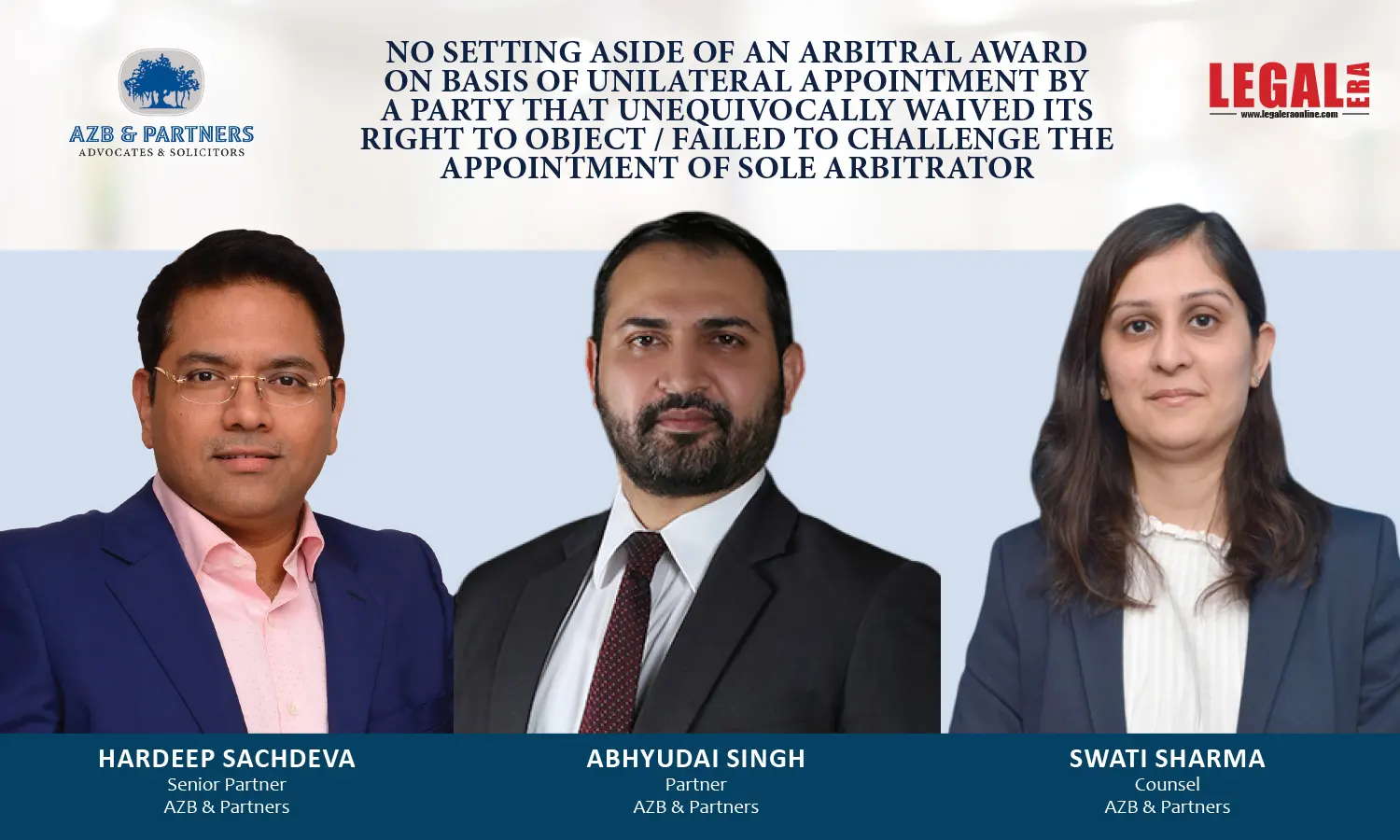No Setting Aside Of An Arbitral Award On Basis Of Unilateral Appointment By A Party That Unequivocally Waived Its Right To Object/Failed To Challenge The Appointment Of Sole Arbitrator

No Setting Aside Of An Arbitral Award On Basis Of Unilateral Appointment By A Party That Unequivocally Waived Its Right To Object/Failed To Challenge The Appointment Of Sole Arbitrator Our Senior Partner, Hardeep Sachdeva,1 Partner, Abhyudai Singh,2 Counsel, Swati Sharma,3 and Associate, Maaz Ahmed4 share their thoughts on the recent judgment of the Hon’ble Madras High Court...
No Setting Aside Of An Arbitral Award On Basis Of Unilateral Appointment By A Party That Unequivocally Waived Its Right To Object/Failed To Challenge The Appointment Of Sole Arbitrator
Our Senior Partner, Hardeep Sachdeva,1 Partner, Abhyudai Singh,2 Counsel, Swati Sharma,3 and Associate, Maaz Ahmed4 share their thoughts on the recent judgment of the Hon’ble Madras High Court ("Court")5, wherein it held that in an arbitration where a party had willingly participated and given its unequivocal consent to the appointment and extension of a sole arbitrator (nominated and appointed by the opposing party), and such party never alleged bias and never challenged the appointed during the course of the arbitration proceedings, the said party cannot, at the stage of the proceedings under Section 34 of the Arbitration and Conciliation Act, 1996, then allege that the arbitral award is vitiated on grounds of unilateral appointment of the sole arbitrator.
Party having waived/failed to exercise its right to object to, and having affirmed in writing to the appointment and consented to extension of the Sole Arbitrator, cannot abuse the judicial process to have the arbitral award set aside on grounds of appointment.
Brief facts
The judgment has been passed by the Division Bench of the Court in appeals filed under Section 37 of the Arbitration and Conciliation Act, 1996 (“Arbitration Act”) by VR Dakshin Private Limited (“Appellant”), against the Order passed by the Single Judge under Section 34 of the Arbitration Act (“Section 34 Petition”), whereby the Single Judge had set aside the arbitral award solely on the grounds that the appointment of the Sole Arbitrator (who was a former judge of the Court), was not permissible and thereafter, appointed a former Judge of the Court (without the consent of the parties).
Briefly, the dispute between the Appellant and Respondents emanated from a lease deed executed between the parties, whereby the Appellant had leased space in its retail mall to the Respondent for operating a store. During the subsistence of the lock-in period under the lease deed, the Respondents intimated the Appellant of their intention to terminate the lease (without cause), and accordingly, dispute between the parties arose and the Appellant commenced arbitration in January 2019.
The Appellant, as per the terms of the lease deed, appointed the Sole Arbitrator, who was a former Judge of the Court. The Respondent neither objected to the appointment, nor filed a petition under Section 11 of the Arbitration Act, and willingly participated in the arbitration proceedings.
Even pursuant to the pronouncement of various judgments in relation to unilateral appointment, including, the Supreme Court’s judgment in the matter of ‘Perkins Eastman Architects DPC and another v. HSCC (India) Limited’6 (“Perkins”), the Respondents did not object to the appointment and continued with the proceedings. Further, when the mandate of the Sole Arbitrator was about to expire, the parties and their respective counsels, also signed and submitted a joint memo (“Joint Memo”) affirming the appointment of the Sole Arbitrator (with effect from February 2019) and extending the mandate of the Sole Arbitrator under Section 29A of the Arbitration Act. The Sole Arbitrator made an arbitral award in favour of the Appellant and against the Respondents.
It was only after receiving the arbitral award, that the Respondents, for the first time, raised an objection regarding the appointment of the Sole Arbitrator in the Section 34 Petition on the ground that the Sole Arbitrator was unilaterally appointed.
The Single Judge relied on Perkins read with the judgment of ‘TRF Limited v. Energo Engineering Projects Limited’7 (“TRF Limited”) and allowed the Section 34 Petition and set aside the arbitral award passed by the Sole Arbitrator. The Single Judge also proceeded to unilaterally appoint a new arbitrator without the consent of the Appellant.
Contentions of the Appellant before the Division Bench
The Appellant submitted that the Respondents had participated in the arbitration proceedings without any protest or challenge, and even executed the Joint Memo affirming the appointment and extending the mandate of the Sole Arbitrator. The Appellant also submitted that there was not a single allegation of bias or unfair conduct.
The Appellant also submitted that the judgments in TRF Limited, Perkins as well as the recent judgment in Central Organisation for Railway Electrification v. M/S ECI SPIC SMO MCL (JV)8, all referred to proceedings where the challenge was raised during the course of the arbitration proceedings.
The Appellant further submitted that in the present case, the challenge was made for the first time only in the Section 34 Petition, despite the existence and knowledge of the TRF Limited and Perkins judgments and after having affirmed the appointment and agreed to the extension vide the Joint Memo. It was also contended that the Respondents had unequivocally waived their right to object in terms of Section 4 of the Arbitration Act and that the Single Judge had made presumptions regarding bias, despite there not being any such allegation. Lastly, it was also contended that the Court in a Section 34 Petition could not have appointed a new arbitrator without the consent of the parties.
The Court after hearing the parties and examining the conduct of the parties, observed that the Respondents admitted to the execution of the Joint Memo, affirming the appointment and extending the mandate of the Sole Arbitrator
Contentions of the Respondents
The Respondents have contended that in view of Perkins, the Appellant could not have unilaterally appointed the Sole Arbitrator.
The Respondents further relied on ‘General Manager, CORE, Allahabad v. JV Engineering Associate Civil Engineering Contractors’10 and contended that the written agreement must happen at the time subsequent to the disputes having arisen between the parties. The Respondents also contended that as per ‘Umaxe Projects Private Limited v. Air Force Naval Housing Board’ mere filing of a petition under Section 29A of the Arbitration Act does not amount to express waiver in writing.
The Respondents admitted that there was never any objection from their side regarding the appointment and that there was no allegation of bias or any favouritism, at any point during the proceedings and that the proceedings had been conducted in a fair and impartial manner by the Sole Arbitrator.
Decision of the Division Bench
The Court after hearing the parties and examining the conduct of the parties, observed that the Respondents admitted to the execution of the Joint Memo, affirming the appointment and extending the mandate of the Sole Arbitrator, which made it clear that the Respondents did not have any objection to the appointment, meaning thereby that the Respondent has waived such ‘disqualification’ and such an express waiver would entitle the alleged ‘ineligible’ Sole Arbitrator to act and proceed with the arbitration proceedings. The Court also noted that the Respondents participated in the arbitration proceedings without any demur or protest, and even after the judgments in TRF Limited, Perkins having been pronounced, the Respondents never objected to the appointment of the Sole Arbitrator, on grounds of any bias (actual or perceived) or any prejudice.
The Court allowed the Appeal and directed that the Single Bench ought to hear the Section 34 Petition on merits. The Court further imposed heavy costs on the Respondent, for having filed vexatious litigation, after awaiting the outcome of the arbitration proceedings, without any pertinent grounds for the disqualification or removal of the Sole Arbitrator.
Conclusion and Analysis
In our view, the Court’s decision is a step in the right direction since the Respondents ought to have taken an objection (if any) to the appointment of the Sole Arbitrator, within the period specified under law, or during the course of the arbitration proceedings. Furthermore, the Respondents’ conduct of executing the Joint Memo, contained an express affirmation and consent to the appointment as well as the further extension of the mandate of the Sole Arbitrator.
The Court has correctly observed that the proceedings were an abuse of the legal process and it would be unfair if a party, having waived its objections continued to participate in the arbitration proceedings, and depending on the outcome of the arbitration proceedings, raised an objection for setting aside of the arbitral award based on the appointment of the Sole Arbitrator, that too when no grounds for disqualification of the Sole Arbitrator under the Fifth or the Seventh Schedule of the Arbitration Act were attracted and there was no element of any unfair or biased conduct.
Disclaimer – The views expressed in this article are the personal views of the authors and are purely informative in nature.




